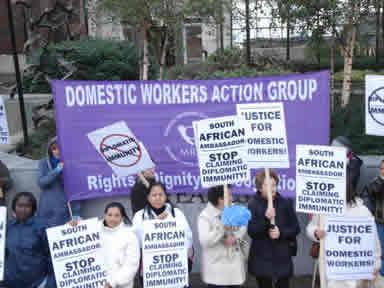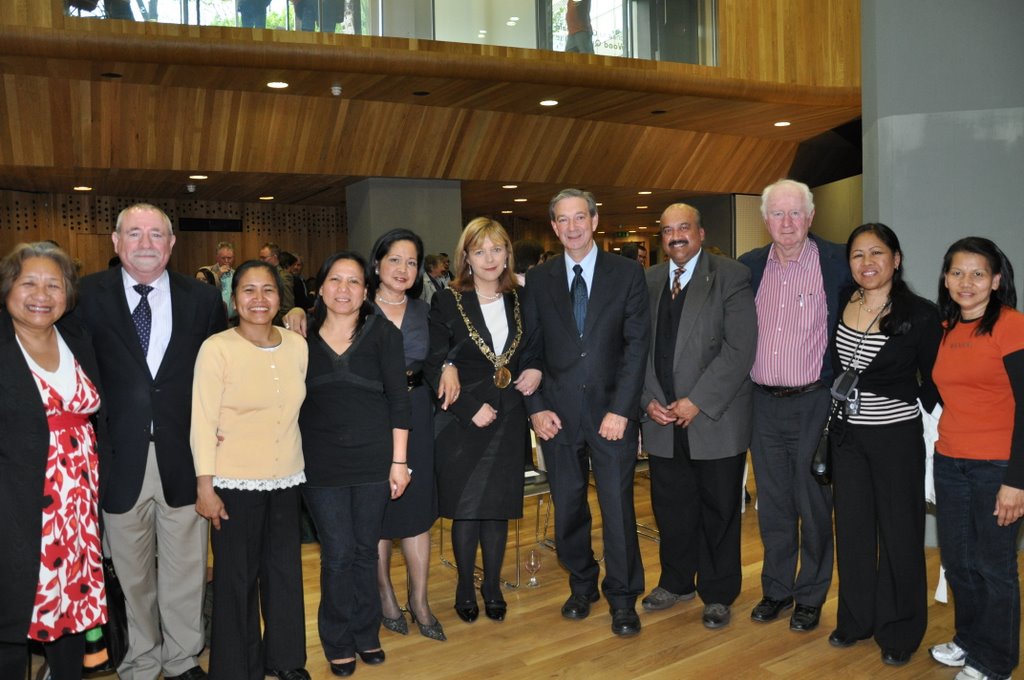Hidden Voices: A powerful rebuke of migrant exploitation

An emotive film documentary telling the personal stories of migrant domestic workers in Ireland was launched this evening by the Domestic Workers Action Group (DWAG) in association with the Migrant Rights Centre Ireland (MRCI). By Malachy Browne.
Hidden Voices: Stories from Behind Closed Doors exposes the exploitative conditions under which domestic workers often live and work, in particular among some of Ireland’s wealthiest households.
(The full version of Hidden Voices will be uploaded to Politico.ie in the coming days.)
Foreign diplomats in Ireland were highlighted as being particularly culpable in exploiting migrant workers. Diplomatic immunity gave “carte blanche” to diplomats and their families to mistreat workers in their home and deny worker's "rights to due process”, tonight’s audience heard.
But the problem is not exclusive to the diplomatic community. In one segment of Hidden Voices (audio embedded below), a migrant worker is heard to ask about her entitlement to the minimum wage and to change employer. Her Irish boss is heard to say: “If you leave this household, you’re going back to Manilla in chains. That’s what’s going to happen.”
Domestic workers in Ireland are known to have been paid below the minimum wage and have been asked to assume greater responsibilities than that agreed with employers. A survey of 50 domestic workers in Ireland (below) showed that 55% earned on or below the minimum wage, with 40% working over 48 hours a week. In a few cases, workers were paid between two and four euro per hour. In one account given this evening, a woman was asked by her employer to work for a second family under the same work permit.
Seventy per cent of people trafficked to Ireland for forced labour work in the domestic sphere. Domestic workers often feel trapped under exploitative situations. Even workers with permits fear losing their jobs, losing their income and savings and becoming homeless. And as the clip below shows, domestic workers may be threatened with these outcomes when they assert their rights.
DWAG was formed by domestic workers in 2004 to enhance the terms and conditions of domestic work in Ireland. It now has 200 members, twenty of whom participated in making the film with the production company Still Films.
 Hidden Voices was launched by Lord Mayor of Dublin Emer Costello who outlined the irony of these exploitative situations. By allowing others to work outside the home, domestic workers create “conditions that generate a lot of wealth, yet there are people who exploit this”.
Hidden Voices was launched by Lord Mayor of Dublin Emer Costello who outlined the irony of these exploitative situations. By allowing others to work outside the home, domestic workers create “conditions that generate a lot of wealth, yet there are people who exploit this”.
A further, deeply personal aberration was relayed through heart-rending accounts of women who sacrifice their families and homes to improve their own children’s life chances. One woman’s account of the heartache she felt leaving behind her three year old child to care for other people’s children in Ireland clearly resonated with many of the migrant workers attending the launch, moving some to tears.
DWAG is calling for four measures:
- An immediate campaign of inspections in the domestic sector
- A protocol for the protection of domestic workers employed in diplomatic households endorsed by the Department of Foreign Affairs
- Governmental support for an International Labour Organisation convention on Domestic Work in 2011
- The establishment of a Joint Labour Committee to set out legal minimum standards for this sector
Anastasia Crickley, a member of the UN Committee on the Elimination of Racial Discrimination and head of the Dept. of Applied Social Studies at NUI Maynooth, said that progress has been made on the issue of diplomatic immunity by the European Court of Human Rights. Recent judgements that distinguished between diplomatic households on the one hand, and goods and services provided to those households. She said that the ILO is soon to hold a convention on domestic workers, and that international backing is forthcoming for what the MRCI is seeking to achieve in Ireland.
However, on the inspection issue, Director of MRCI Siobhan O’Donoghue explained after the film that constitutional challenges exist to providing a basis for house inspections.
Recording of domestic worker who confronts employers about poor working conditions:
Survey of 50 Domestic Workers in Ireland conducted by MRCI
Sex: 100% Female
Nationality: 92% Filipino
Age: between 29-63, average: 44
Residency status: 46% have resident status (Stamp 4), 38% is on work permits, 12% undocumented, rest-student, dependant
62% work as child minders, 32% as cares, the rest is doing household work only. 70% of child minders and carers on top of their specific duties do also following house hold works: cleaning, cooking, feeding children/disabled person, washing, ironing etc. Sometimes they are asked to do some extraordinary works like: washing a car, cleaning other house or office of their employers, feeding farm animals
20% of Domestic Workers work more than 5 days a week.
Working over 48 hours a week: 40%
38% is paid under minimum wage, with few cases where a domestic worker is paid between 2-4euros/hour.
Paid minimum wage: 17%
Work Sundays or Bank Holidays without extra pay/day off: 30%
Does not receive payslips: 42%
Employers do not pay taxes/PRSI: 22%
Do not have a written contract: 40%
Live in: 58%
60% experienced exploitation in Ireland as a Domestic Worker. That relates mostly to very long working hours without proper pay or working extra hours with no payment (severe cases are currently paid between 2-5 euros per hour).
44% of them raised a concern to the employer about their unfair payment and long working hours but their concern was ignored and nothing has changed. 27% of unfairly treated has not complained as they were afraid they would lose their job, will be sent home or deported (the undocumented ones). The rest does not want to complain due to the fear of destroying the relationship between them and the employers (‘it’s hard to complain when you live-in’ and emotional dependence - they feel treated as a part of the family so they don’t feel it’s fair to complain.
30% of those who experience severe exploitation in their first job in Ireland, got out from the exploitative situation after contacting MRCI. They are now in fair employment knowing their rights and entitlements.
58% of the respondents think that unfair pay and treatment of domestic workers in Ireland is widespread.
Domestic Workers Survey – Quotes
Opinions on unfair treatment of domestic workes in Ireland
‘There are a lot of employers who are looking for illegal people so they don’t have to pay taxes and can pay less.’
'I think there is a lot of people in a difficult situation similar to mine but they don’t know what to do or where to seek help’
‘There are people [employers] who treat unfairly, they need us but they don’t want us to have our rights. Only because we don’t want to lose our jobs we agree to work like that.’
‘I was paid under the minimum wage at the beginning when I arrived to Ireland. I didn’t know the minimum rates.’
‘They take advantage of us being from poor countries’
‘The biggest problem is when the work permit expires. People who are undocumented are the most exploited.’
‘If you live in it’s very hard, everything is work but it doesn’t count’
‘The low pay is understandable because of the recession now’
‘They value me, because I’m essential for them but I feel I’m not respected when it comes to my payment and rights. I feel exploited emotionally (that’s apart from my payment), I’m so attached to the kids I’m taking care of, especially that I miss my own children.’
‘They made me cry many times…they said they would send me home if I cry again…’
‘3years ago I was accused of stealing in the house. I lost my job and other customers. I was totally depressed because of that.’
‘I was working hard but I didn’t feel I was good enough…the boss was screaming at me’
‘I said I was very tired because of working all the time… the employer told me that I could look for another job if I don’t like it but I won’t find it because of the recession.’
Complaining to the employer:
‘I didn’t want to complain as I didn’t want to upset them, I felt that if I complain I may lose the job. Once I wrote them a letter because I had no guts to talk to them personally…all the things I was unhappy about, but they didn’t give me what I wanted.’
‘I was afraid to complain as I was afraid that they start picking on me for nothing and will be watching me carefully to find faults’
‘It’s hard to complain when you live in the house’
‘I really need my job, I don’t want to complain, it’s hard times now’
‘I didn’t want to complain, because they treated me like family, I was alone here, I didn’t have anybody..’
‘When you are under somebody you can’t say anything, she knew I was illegal here, I was afraid. She said: You don’t have papers, you can’t go anywhere or you’ll be sent home. When you are illegal and you don’t know your rights, it’s very hard.’
‘I am afraid to complain because my children are here and they are also illegal, my employer knows that, I’m afraid to be reported.’
‘My employer said they knew my situation, that I was illegal and that I had children, they said that they knew many people, including Gards, so I have to be careful’
‘I raised the issues of working long hours but they said that it work this way when you live-in..’
‘I was threatened. She [the employer] said that Garda would come and send me home…I was undocumented because she didn’t do my papers’
‘I asked my employers about my Work Permit, they said didn’t know how to apply for one. They haven’t done anything’
What needs to happen to improve conditions for domestic workers:
‘Domestic workers must know their rights and terms and conditions of work before they start working’
‘It helps if you talk to your employer before you start working. You should be open and talk about conditions of work otherwise they take it for granted.’
‘It is important to have clear contract when you live-i, because it’s hard to measure when you work or when you don’t.’
‘Employers should know limitations of the worker. Working hours should be limited to 9 hours a day.’
‘Information about DW being treated badly should be widespread.’
‘Workers should be given the possibility to complain somewhere and report bad employers’
‘To force employer to comply with the government requirements around work permits, minimum pay, etc.’
‘To be able to report bad treatment of employers so they would get a sort of warning.’
‘Make the bad treatment public – go to newspapers, media…’
‘Solidarity with other DW and speaking out’
‘If we have unity we can do something. Unity is the number one!’
‘People must know where to go, organizations like MRCI, spread information about it’
‘Inform people about their rights. Seek advice if something wrong is happening.’
‘The government should recognise child minder as a profession.’
